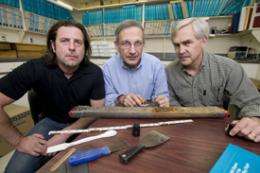Rutgers scientists: Asteroids did kill the dinosaurs

(├╚├├╔šă°Org.com) -- Sometimes, you just canÔÇÖt trust the iridium. A silvery-white natural metal thatÔÇÖs a member of the platinum family, iridium is a key ingredient in the manufacture of spark plugs. Iridium is also an important piece of evidence in a mystery that scientists have debated for decades ÔÇô why did dinosaurs disappear from the face of the earth?
The prevailing scientific consensus is that at least one asteroid ÔÇô possibly more ÔÇô hit the earth about 65 million years ago, showering the planet with dust and debris, blocking sunlight, causing firestorms, and marking the end of the Cretaceous Period and the beginning of the Paleogene Period. Most scientists believe the impact was directly responsible for the mass extinction of many species of plants and animals ÔÇô most famously, the dinosaurs.
The impact also left a clue ÔÇô a chemical signature in the earthÔÇÖs crust called the ÔÇťiridium anomaly.ÔÇŁ Iridium is rare in the earthÔÇÖs crust but far more abundant in asteroids. ThatÔÇÖs why, all over the world, scientists find unusually high concentrations of iridium in sediment layers at the boundary between the Cretaceous and Paleogene periods ÔÇô called the K-Pg Boundary by geologists.
All over the world, that is, except in Freehold, New Jersey ÔÇô 25 miles down the highway from Rutgers UniversityÔÇÖs New Brunswick Campus.
In several cores drilled at sites around New Jersey ÔÇô much of which was covered by the ocean when dinosaurs roamed the earth ÔÇô fossilized sea creatures are found below the K-Pg Boundary, buried by debris that contains iridium. This evidence supports the iridium anomaly ÔÇô and the consensus that asteroids killed the dinosaurs..
But not in Freehold. In 2007, scientists Neil H. Landman, of the American Museum of Natural History, and Ralph O. Johnson found fossils above the iridium-laden boundary in FreeholdÔÇÖs Tigh Park. Johnston is a self-educated paleontologist from West Long Branch, N.J.
Some scientists argue that the work of Landman and Johnson casts doubt on the asteroid consensus. These scientists say the Freehold evidence suggests dinosaur extinction was caused by catastrophic volcanic eruptions.
Enter Rutgers geologist Ken Miller, a professor of earth and planetary science in the School of Arts and Sciences. According to a paper authored by Miller, Rob Sherrell, Paul Field. and their colleagues in the journal Geology, the real explanation for the Freehold findings is far more simple: The iridium moved.
And how do they know that? Sherrell and Field, of the Institute of Marine and Coastal Sciences in the School of Environmental and Biological Sciences, went through a highly specialized, painstaking process of geochemical analysis to pinpoint the location of the K-Pg barrier at another Freehold site near the one excavated by Landman and Johnson..
Sherrell and Field analyzed sediment samples from the layers near and within the K-Pg boundary, using a method called nickel-sulfide fire assay to do the job. They melted the sediment at a high temperature, forming a bead of nickel sulfide. The iridium migrated to the bead, and the bead itself was in a crucible of sediment glass formed by the melting. They broke that glass to get to the bead, and then dissolved the bead in acid. The nickel dissolved and the iridium was left behind as very fine particles in the acid. They filtered the solution, and then dissolved those tiny particles in a second acid solution. This process produced a purified iridium solution that Field and Sherrell analyzed in their mass spectrometer.
ÔÇťWe infer that, at the Freehold site, the iridium has migrated,ÔÇŁ Sherrell said. Just what caused the iridium to ÔÇťmigrateÔÇŁ below the layer of fossils isnÔÇÖt clear.
Miller, the geologist, speculates that the sediment is sandier at the site in Freehold than at other sites in New Jersey, and this may have allowed what he calls ÔÇťpercolationÔÇŁ to occur. But the bottom line is clear: ÔÇťThe iridium │ż┤ă▒╣▒╗ň.ÔÇŁ
Provided by Rutgers, The State University of New Jersey

















